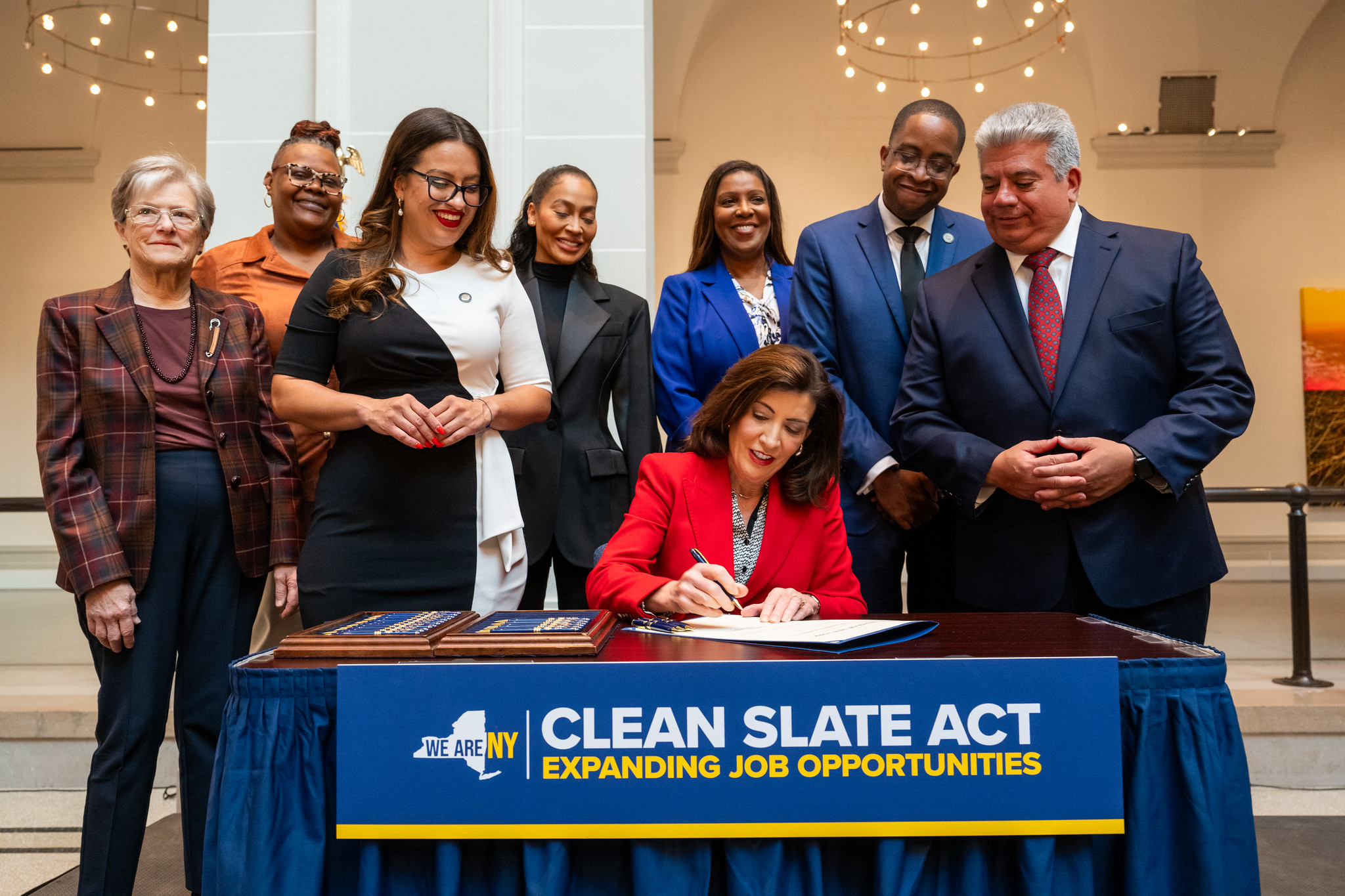
November 16, 2023 — Brooklyn, NY — Governor Kathy Hochul signs the Clean Slate Act, which allows certain criminal records to be sealed years after an individual is sentenced or released from incarceration if they are not convicted of another crime.
New York state has joined 11 other states with “clean slate” laws that seal the criminal records of formerly incarcerated people with the goal of making it easier for them to find housing and jobs.
Gov. Kathy Hochul on Tuesday signed the Clean Slate Act (S.7551A/A.1029C), which allows certain criminal records to be sealed years after an individual is sentenced, or released from incarceration if they are convicted of another crime.
The law, which goes into effect on November 16, 2024, blocks prospective employers, roommates, landlords and others from accessing criminal records for most misdemeanors and many felonies.
Following their release from prison, records of individuals with eligible misdemeanor convictions will be sealed after three years and those with certain felony convictions, after eight years.
Critics of the new law note that New York already has processes in place for judges to seal criminal records. And once the new law takes effect, convictions for manslaughter, attempted murder, gang assault, attempted kidnapping, burglary, and robbery will be hidden from landlords, roommates and employers.
But supporters say it will help reduce systemic barriers that have shut more than two million New Yorkers out of the labor market, reduce recidivism, and strengthen communities and economies by giving people willing to work the opportunity to do so.
“The best crime-fighting tool is a good-paying job. That’s why I support giving New Yorkers a clean slate after they’ve paid their debt to society and gone years without an additional offense,” Hochul said. “As our state faces a worker shortage, with more than 450,000 job openings right now, this new law will help businesses find more workers who will help them grow, expand and thrive.”
Assemblywoman Catalina Cruz, the bill’s sponsor, said there are 2.3 million New Yorkers who may be eligible to have their criminal records sealed under the Clean Slate law.
“Ensuring that people can work and find housing is the best way to keep our communities safe, reduce recidivism, and break the cyclic poverty and mass incarceration for generations to come,” Cruz said. A study by the Prison Policy Initiative found that the unemployment rate for those with an arrest or conviction record in the U.S. is over 27 percent.
The law does not seal the records of those who are convicted of sex crimes, murder or other non-drug Class A felonies.
And police, prosecutors, the state Education Department and courts will still have access to all criminal records under the new law.
Assembly Minority Leader Will Barclay, R-Pulaski, called the new law a “misguided policy.”
“For a governor who claims that her number one priority is protecting the people of New York, she sure has a funny way of showing it,” Barclay said. “We all believe in second chances, but unilaterally sealing criminal records is hardly the way to go about it. The bill prioritizes those who have broken the law while once again disregarding the victims impacted by their actions.”
Barclay said Tuesday that New York state already had processes in place for judges to seal criminal convictions.
“Without input from judges, victims or prosecutors, Albany Democrats took it upon themselves to hide vicious and violent crimes from background checks,” he said. “Convictions for manslaughter, attempted murder, gang assault, attempted kidnapping, burglary, robbery – and many others – will essentially be swept away with the stroke of the governor’s pen.
“The overwhelming majority of New Yorkers identify crime as a problem. And for those New Yorkers, the Clean Slate Act represents the latest step in the wrong directions. This is yet another pro-criminal, misguided policy from the people intent on dismantling law and order and removing individual accountability.”
Critics of the new law also point out that the law was passed on June 9, 2023, the last day of the 2023 legislative session, without adequate time for discussion or debate.
“Kathy Hochul needs to stop pandering to the far-left of her party at every crossroad,” said Lee Zeldin, a former congressman and the Republican challenger to Hochul in 2022. “If she was serious about protecting law-abiding citizens instead of criminals, she would have vetoed this dangerous bill. In Kathy Hochul’s New York, pro-criminal laws have been surrendering our streets to criminals, our law enforcement officers are not adequately supported, and we remain the only state in the nation that does not allow judges discretion to weigh dangerousness when setting bail.”
Congressman Zeldin previously issued a statement calling on Kathy Hochul to veto the Clean Slate Act after it was passed on June 10, 2023.









